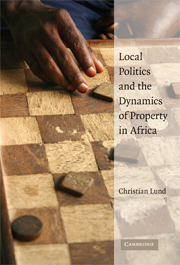Book contents
- Frontmatter
- Contents
- List of Maps, Figures, and Tables
- Acknowledgments
- Abbreviations
- Map 1 The Gold Coast, 1907
- Map 2 Regions of Ghana since 1983
- 1 Introduction
- 2 “This Situation Is Incongruous in the Extreme”: The History of Land Policies in the Upper Regions of Ghana
- 3 Who Owns Bolgatanga? The Revival of the Earthpriest and Emerging Tensions over Property
- 4 Seizing Opportunities: Chieftaincy, Land, and Local Administration
- 5 Settled Facts or Facts to Settle: Land Conflicts under Institutional Uncertainty
- 6 “Bawku Is Still Volatile”: Ethnopolitical Conflict and State Recognition
- 7 The Rent of Nonenforcement: Access to Forest Resources
- 8 Small Dams and Fluid Tenure
- 9 Conclusion
- References
- Index
8 - Small Dams and Fluid Tenure
Published online by Cambridge University Press: 25 July 2009
- Frontmatter
- Contents
- List of Maps, Figures, and Tables
- Acknowledgments
- Abbreviations
- Map 1 The Gold Coast, 1907
- Map 2 Regions of Ghana since 1983
- 1 Introduction
- 2 “This Situation Is Incongruous in the Extreme”: The History of Land Policies in the Upper Regions of Ghana
- 3 Who Owns Bolgatanga? The Revival of the Earthpriest and Emerging Tensions over Property
- 4 Seizing Opportunities: Chieftaincy, Land, and Local Administration
- 5 Settled Facts or Facts to Settle: Land Conflicts under Institutional Uncertainty
- 6 “Bawku Is Still Volatile”: Ethnopolitical Conflict and State Recognition
- 7 The Rent of Nonenforcement: Access to Forest Resources
- 8 Small Dams and Fluid Tenure
- 9 Conclusion
- References
- Index
Summary
Well, I happen to know that whenever you feel agitated and ambivalent, then you do indeed have something to write about.
Philip Roth, DeceptionIntroduction
Local communities and land tenure arrangements do not operate autonomously from the wider political structures of the state (see Mosse, 1997). Government schemes create junctures for people to reassert or to challenge the situation according to interests. Government regulation thus plays an important yet subtle role in the local production of land rights and wealth; although much policy is frustrated by circumvention of rules and regulation, it may well influence and entrench the social stratification. In other words, it affects the forms of property and the production of social classes and stratification.
Public and private interests compete for resources in various ways in northern Ghana. People's struggles to establish and solidify rights and rules are constantly challenged by others' efforts to remake or replace them. The result is that particular resources are negotiated into a texture of composite property relations that defy simple public-private distinctions. The dynamic tension between reproduction and change in this negotiation intensifies when the stakes go up. Small dam schemes present particularly tense situations. The construction of the irrigation infrastructure increases the value of property, and the very operation involving public investment occasions a renegotiation of land rights in ways in which government has only partial control.
Obviously, one of the issues at stake is what policies on irrigation mean to ownership. Ownership is never absolute or stable (see Chapter 1).
- Type
- Chapter
- Information
- Local Politics and the Dynamics of Property in Africa , pp. 156 - 173Publisher: Cambridge University PressPrint publication year: 2008

